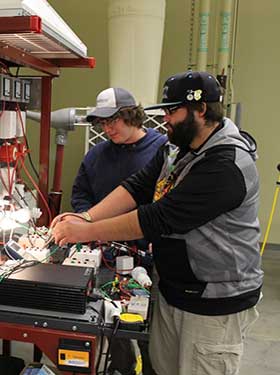In higher education we conduct research for a variety of reasons, including program review, determining trends in the labor market, and assessing institutional effectiveness. Much of this involves collecting and analyzing quantitative data. In trying to make sense of the data, we utilize advisory committees involving external partners for program development and review. One method of program review many Illinois community colleges utilize is Pathways to Results (PTR), which focuses on student outcomes through identification of gaps in equity. Gaps in equitable outcomes for students are typically identified through the disaggregation of data…lots and lots of data. Data considered includes student demographics, course completion, certificate completion, degree completion, fall to spring retention, fall to fall retention, transition from secondary to postsecondary status, student placement in employment, etc. However, sometimes forgotten in the midst of the intensive quantitative data analysis is the importance of qualitative data.
Qualitative data from student surveys or focus groups can be collected at various phases of the PTR process for a number of reasons, including verification of what the quantitative data suggests. As part of Black Hawk College’s current PTR project, the leadership team felt the quantitative data that had been collected in relation to student completion was not telling the whole story. Since the Engineering Technology program is the only program which requires Technical Math, the course completion data was very limited. The leadership team determined that feedback from students who were set to complete the program would be useful, so a focus group was held. It was hoped that by determining what successful students felt were barriers and how they felt the program could be improved, the team would be able to develop a comprehensive plan to improve student outcomes.
When implementation of process improvement has begun, qualitative information is valuable in determining whether solutions are working as intended or need to be revised. From information learned through the focus group, part of the process improvement plan for the Engineering Technology program came to include tutoring for Technical Algebra & Trigonometry. To determine how tutoring was being utilized by students, another focus group was held. Through this focus group, the team learned of one student who was unable to attend tutoring because of a schedule conflict, so future goals include more flexible tutoring. Additionally, more insight was gained on students’ course taking habits and work schedules, which will be useful as the project moves forward.
As someone who has utilized both methods of data collection, I prefer focus groups. Focus groups allow for immediate follow-up when participant responses prompt the need for clarification or additional information. At each of the focus groups I have moderated, students have thanked us for taking the time to speak with them. Following the last focus group session, the team found that Engineering Technology students have been stronger self-advocates in reaching out for assistance. Speaking directly to students empowers them by letting them know their opinions matter and their voices are heard.
